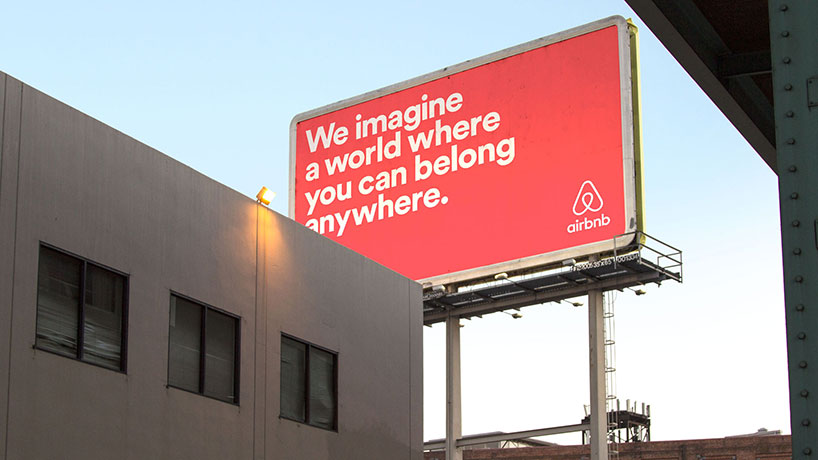The sharing economy works not just for Airbnb, but creative agencies too
A sharing economy is a collaborative economy, and that can only be a good thing for creatives, writes Sarah Bailey.
While most memories of my uni days are a bit hazy, one has remained crystal clear. It’s of an economic theory lecturer who challenged the wisdom of ownership over-sharing. The example he used was a lawnmower.
Why, he asked, does everyone on a street buy one, when most households only have a small lawn that needs cutting every few weeks?
It was a question I’d never asked. To me, buying a lawnmower was just something you did when you became an adult with a house in the ‘burbs and a patch of grass big enough for a medium-sized dog to bound around on.

Bailey: Letting go of control is a challenge for ‘ideas people’
But it got me thinking then, and has done on and off, ever since.
Obviously, an opinion piece that challenges the logic of everybody buying their own stuff is on thin ice when it’s written by someone in marketing. But having recently joined a smaller company after years within the global networks, I want to explore what ‘lawnmower theory’ means for the way our business operates.
Exclusive ownership has three benefits: control, convenience and status.
Group purchasing on the other hand, means it’s unlikely you’ll end up with exactly the mower you’d choose yourself. Entering a sharing arrangement means it’s possible someone else might want to use it at exactly the same time that you do. And finally, how do you display your material power by always having the latest model? In this theoretical suburb, everyone’s equal from a grass maintenance perspective.
Clearly, shared resources are not without their first-world challenges.
Or at least they used to be. The rise of services like Airtasker, Airbnb, and the news that luxury car makers will soon install fleets for apartment dwellers to rent on demand suggests the world is changing fast – and our attitudes to the control of our stuff along with it.

Imagine a world where strangers can pay you to come and live in your house
Time is still money but now, so is downtime. Both ours and the downtime of the things we own.
Why wouldn’t you have someone pay to use your house when you’re not there? Or rent a fancy dress for a quarter of what it’d cost to buy? Sure, you have to let someone into your private space and the dress is not yours to keep, but sharing has financial upsides that are often well worth the trade off.
So what does all this have to do with running a creative business?
In short, I think embracing the same attitude in our professional lives has the potential to deliver a similar return.
Now, I realise letting go of some control is a challenge for everyone in the ideas business. Whether as companies or individuals, we’re one of society’s more brutal examples of ‘what we’ve done’ dictating what we’re worth. But as the economy becomes ever more collaborative around us, it’s a reality we have to face. And quickly.
Because if expanding rosters tell us anything, it’s that clients are already happy to ask more than one set of brains to co-operate in solving their problems. And more than a few are questioning the economics of owning the time of one agency full of specialists just in case we need them.
Which is why, after a decade and a half in global networks, I decided to approach things a little differently.
As an entrepreneurial, project-based creative business, our company works in a way I think will soon be the industry norm; fluid, flexible and structured to tap into the abundance of talent that no longer wants to be tied to a desk.
Consequently, we’re the ‘lawnmower’ that quite a few advertising and design agencies borrow on a regular basis and it’s an arrangement that makes sense for both parties.
We can step in at any point in the process, help create content as efficiently as possible and then step out of the way. And as we can’t afford to have people sitting around waiting for the work to come in, we in turn call on a trusted circle of people when needed.
Just as agencies do with us.
After years in the networks, I also appreciate how this approach straightens out the business pipeline. If we do a good job, we’ll be called on again. It’s that simple.
And that’s just one of the things I like about this new paradigm.
Others are the focus on results and the simple, project-by-project structure. In my experience, anything that removes layers separating brains and the problem you’re asking them to solve will result in more interesting ideas, thoughtful executions and better outcomes for everyone.
But above all, I believe client demand is in the process of making our industry more collaborative by nature. And creatively, that’s an overwhelmingly good thing.
Not trying to be all things to all people all the time means that we can be exactly the right partner for the right project at the right time. Obviously, we’ve had to financially structure our business to achieve that degree of flexibility, but it’s mostly been about separating what we want from what we really need.
Or what we think we need.
And while I can still see why it’s nice to have the latest lawnmower sitting in your shed ready for the hour or so each month you need to use it, I have come to realise that just because you can, doesn’t mean you should.
Sarah Bailey is a partner/business director at Mr Smith, a creative projects company


A major downside to being a freelance creative is missing out on the prolonged exposure to a client. I find it really helpful to be in tune with the continuum of their business, particularly when pro-active stuff strikes, maybe based on a snippet of conversation or an article with a revealing insight. Agencies don’t necessarily get that added value when they hire a creative on a project by project basis. Then again, they might not need that added value either.
Nice article, but I’m no lawnmower.
Hasn’t Host been using ( or previously used) this model of outsourcing creative for years?
My father taught me the same lesson. We had a country property and rather than own harvesters which were capital intensive, needed upgrading regularly, prone to break down and only used for one week a year we employed contractors. I would like to agree with you for professionals to collectively work together on projects however is more difficult to achieve and economically challenging for the participants.
Hi, good start to the article, but you’ve lost the point of your intro as soon as you delve into your own spiel.
A lawnmower does a well-defined job (mowing grass, and possibly weeds) and is typically under-utilized, for all the reasons you mention – sharing it makes absolute sense
It’s great that you think you’re a lawnmower, but unfortunately the analogy starts to fall down there
* there’s no prestige in having you or other marketing agencies hanging around in the garage. Unfortunately, too, this comes at an unnerving continuing cost, as opposed to the single purchase price for the example
* the sharing of the lawnmower allows each owner pays a portion of its purchase price. Without excess supply (people buying lawnmowers grossly surplus to their need for them) there are no economies to be had here – unless you start reducing your rates proportionate to the number of clients you have, to keep your overall profits fair (i.e. constant), such that clients benefit from your mower status.
I hate to say it, but the first two paragraphs of this are interesting. The rest is fairly blatant self-promotion and doesn’t promise anyone other than yourself any benefit
Excellent view of things: idle capacity or idle time can be seriously potentilised to reshuffle roles and maximising productivity